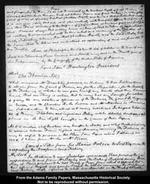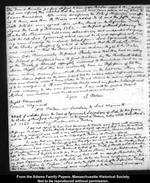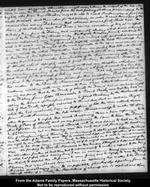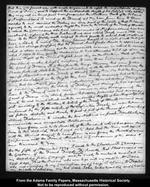and frequented by them so as not to encroach on the territorial rights, which may remain to her after the termination of the present War as aforesaid, and War should thereupon break out between the said United States and Great Britain; or if Great Britain shall molest or disturb the Subjects and Inhabitants of France, in taking Fish on the Banks, Seas and Places formerly used and frequented by them, so as not to encroach on the territorial Rights of Great Britain as aforesaid, and War should there upon break out between France and Great Britain; in either of these Cases of War as aforesaid, His Most Christian Majesty and the said United States shall make it a common cause, and aid each other mutually with their good offices, their Councils and their Forces, according to the Exigence of Conjunctures, as becomes good and faithfull Allies: Provided always that nothing herein contained, shall be taken or understood as contrary to or inconsistent with the true intent and meaning of the Treaties already subsisting between His Most Christian Majesty and the said States, but the same shall be taken and understood as explanatory of and conformable to those Treaties."
Done at Philadelphia this Sixteenth day of October in the Year of our Lord one Thousand, Seven hundred and Seventy nine, and in the Fourth Year of our Independence, by the Congress of the United States of America
Signed Saml. Huntington President
Attest Cha Thomson Secy.
What measures Mr. Franklin pursued, in Obedience to these Instructions to obtain from the Court of France, any farther Stipulations for the Security of the Fisheries, or whether he ever gave himself any trouble about them I never knew. But one Thing is certain, that he never had any Success: for instead of giving Us any additional Assurances of the Fisheries, The Count De Vergennes in Europe, and the Chevalier De La Luserne and Mr. Marbois in America in subordination to him, entered into many insidious Intrigues to deprive Us of them. This base and injurious Policy will be detailed, devellopped and placed in its true Light hereafter, in the Course of these Papers.
As it is uncertain what Questions may hereafter be started, and What Pretensions may be advanced between France, England and America, concerning The Fisheries, it may be usefull to preserve in this Place some Papers which I obtained in 1778, I believe from Mr. Lee or Mr. Izzard.
Copy of a Letter from Sir Stanier Porteen to Lord Weymouth respecting the Newfoundland Fishery.
My Lord
In Obedience to your Lordships commands, I have perused the Correspondence to and from Mr. Stanley and The Duke of Bedford, during their Stay at Paris, previous to the last Treaty of Peace, from which it appears, that in their different Projects and Counter Projects, the Articles concerning the Newfoundland Fishery, chiefly referred to what was stipulated in the Treaty of Utrecht.
The French Ministers pressed at first, to have Cape Breton ceded to them, and when that was refused, they insisted that they must have some place, as an "Abri" to secure themselves. After many discussions, the Isle of Miquelon was offered to them, and then St. Pierre was added to it, and the fifth and sixth Articles were agreed upon as they stand in the Definitive Treaty signed the tenth of February 1763. . . . On the first of March following, the Duke De Nivernois held a very extraordinary and unexpected Language with the late Lord Egremont, which cannot be so well expressed, as by sending your Lordship the inclosed Extract from Lord Egremonts Letter to the Duke of Bedford, by which it appears, that the Duke De Nivernois insisted "that the French had an exclusive Right to the Fishery from Cape Bonnavista, to Point Riche, and that they had, on ceding the Island of Newfoundland to Great Britain by the thirteenth Article of the Treaty of Utrecht, expressly reserved to themselves such an exclusive Right, which they had constantly been in Possession of, till they were entirely driven from North America in the last War." Many successive Letters passed on the same Subject, but the inclosed extract sufficiently explains what your Lordship wished to know, whether the French claimed the exclusive right, or solicited to be indulged in it. If your Lordship should want any further Ecclaircissement I will endeavour to obey your Commands. I am, with the greatest Respect, My Lord, your Lordships most humble and most obedient Servant.
The French Ministers pressed at first, to have Cape Breton ceded to them, and when that was refused, they insisted that they must have some place, as an "Abri" to secure themselves. After many discussions, the Isle of Miquelon was offered to them, and then St. Pierre was added to it, and the fifth and sixth Articles were agreed upon as they stand in the Definitive Treaty signed the tenth of February 1763. . . . On the first of March following, the Duke De Nivernois held a very extraordinary and unexpected Language with the late Lord Egremont, which cannot be so well expressed, as by sending your Lordship the inclosed Extract from Lord Egremonts Letter to the Duke of Bedford, by which it appears, that the Duke De Nivernois insisted "that the French had an exclusive Right to the Fishery from Cape Bonnavista, to Point Riche, and that they had, on ceding the Island of Newfoundland to Great Britain by the thirteenth Article of the Treaty of Utrecht, expressly reserved to themselves such an exclusive Right, which they had constantly been in Possession of, till they were entirely driven from North America in the last War." Many successive Letters passed on the same Subject, but the inclosed extract sufficiently explains what your Lordship wished to know, whether the French claimed the exclusive right, or solicited to be indulged in it. If your Lordship should want any further Ecclaircissement I will endeavour to obey your Commands. I am, with the greatest Respect, My Lord, your Lordships most humble and most obedient Servant.
Signed S. Porteen
Right Honourable Viscount Weymouth.
N.B. Porteen was Secretary to Lord Weymouth.
Extract of a Letter from the Earl of Egremont, Secretary of State, to his Grace the Duke of Bedford, Ambassador at the Court of France, dated
White Hall, March 1st. 1763
respecting Newfoundland Fishery.I did not expect to have had Occasion to trouble your Grace, with another Messenger so soon; but his Majesty has judged it highly expedient, that I should, without loss of time, acquaint you with a very extraordinary Conversation, I had on Saturday last with the Duke De Nivernois, on the Subject of the Fishery at Newfoundland.
In order that your Grace may understand what gave rise to this Conversation I must observe, that, since the Success of his Majesty's Arms in North America, the British Fishermen have resorted more than they used formerly to do, to the Northern Parts of Newfoundland, where by the thirteenth Article of the Treaty of Utrecht, a Liberty had been left to the French to fish, and to dry their Fish on Shore; and for that purpose to erect the necessary Stages and Buildings, but with an express Stipulation, "De ne pas sejourner dans la ditte Isle, au dela du tems necessaire, pour pecher, et s cher le Poisson." And as by the fifth Article of the Definitive Treaty the same Priviledge is renewed and confirmed to the French, it was appre
hended some disagreable Altercations might arise, between the Subjects of the two Nations, in case the French should find the best fishing Stations preoccupied by the English, who, from their Situation might be able to reach Newfoundland first, and would probably exert themselves for that purpose, in order to avail themselves of the received Law among Fishermen, that whoever arrives first, shall have the choice of the Stations, and that France would complain of this, as in effect excluding them from the Fishery, and consequently eluding what it was certainly meant by the Treaty they should enjoy. His Majesty therefore, firmly resolved to observe religiously every Engagement he had entered into, and whose earnest Wish is to avoid every Thing, that could possibly create the least Uneasiness between the two Courts, thought it the most agreable to the open and candid manner in which the whole Negotiation has been conducted, that I should speak to the French Ambassador on this Subject, and to obviate any dispute on this matter, that I should make him sensible of the clear meaning of the Treaty of Utrecht, which expressly cedes to Great Britain, the Absolute Property of the whole Island of Newfoundland, without any exception whatever; at the same time granting to the French Subjects, a Liberty to resort to a limited part thereof for the purpose of taking and curing Fish only, and this Liberty is confined to the Season of the Year, proper for that occupation. But on my opening this matter to the Duc De Nivernois I was greatly surprized to find his Excellency insisting, with more warmth than I have hitherto observed in him on any one point, that by the Treaty of Utrecht, the French had an exclusive right to the Fishery from Cape Bonavista to Point Riche, and that they had, on ceding the Island of Newfoundland to Great Britain, by the thirteenth Article of that Treaty, expressly reserved to themselves, such an exclusive Right, which they had constantly been in possession of, till they were entirely drove from North America, in the late War. -- It was needless to make Use of any other Argument to refute this weak Reasoning, than a bare reference to the Treaty of Peace of Utrecht, and on my producing the same to the French Ambassador he seemed much struck with it, and desired to look on the Treaty of Commerce, but on turning over this last, and not finding the least mention of Newfoundland therein, he endeavoured to distinguish between the Spirit and the Letter of the Treaty, and tho' he would not support his assertion of an exclusive right by any Stipulation in any Treaty, he still insisted on it with so much Warmth as even to let drop some insinuations, as if it might occasion the Renewal of the War.-- On finding the Duc De Nivernois in this temper, I thought it better not to push the Altercation further at that time, but to reserve myself to make a report to the King of what had passed, which having done, I am in consequence thereof, commanded by his Majesty to despatch this Messenger to your Grace, and to signify to you the Kings Pleasure, that you should lose no time in explaining this matter to the French Ministers and shewing them the impossibility of his Majestys departing from the express Letter of a Treaty, the Stipulations whereof are so explicit and clear,
that they will furnish you with ample Arguments to refute the unjustifiable Pretensions of France, and to support the indisputable Rights of his Subjects, who, altho they may not in times past have frequented the Northern Parts of the Island of Newfoundland so much as the French, yet they have from time to time resorted to and exercised the Fishery on every part of the Coasts of that Island agreably to the most undoubted Right they have by the Words of the Treaty of Utrecht, to which the Commodores, who have commanded at Newfoundland, have been constantly referred by their Instructions, and which Treaty must still continue to be their Guide, with respect to such parts to which both Nations have a Liberty to resort. The King, however, thought it consistent with that Candor he has always professed, that the French Ambassador should be apprized of what is above mentioned, but the unreasonable manner in which he received what I said to him, and the Pretension he has attempted to set up of an exclusive Right of the French to fish and dry on the Northern Parts of Newfoundland make it highly necessary to come to an Ecclaircissement with the Court of France. It is therefore the Kings Pleasure, that your Grace should forthwith state to the French Ministers, with the utmost precision, the express Stipulations of the Treaty of Utrecht, letting them see that the King must support his Subjects in the Rights they have thereby acquired, but at the same time, that his Majesty, far from entertaining the most distant Thought of rendering illusory the Liberty of Fishing and drying he has agreed to leave to the French, will be ready to concur in any Arrangement, the Court of France may think proper to propose, provided such Arrangements be not inconsistent with the undoubted Rights of his Majestys Subjects according to the thirteenth Article of the Treaty of Utrecht, renewed and confirmed by the fifth Article of the Definitive Treaty, in order to prevent all future disputes, and thereby to put it out of the Power of a Number of illiterate Fishermen to involve the two Nations in fresh Troubles by any unreasonable and unequitable Pretensions.
hended some disagreable Altercations might arise, between the Subjects of the two Nations, in case the French should find the best fishing Stations preoccupied by the English, who, from their Situation might be able to reach Newfoundland first, and would probably exert themselves for that purpose, in order to avail themselves of the received Law among Fishermen, that whoever arrives first, shall have the choice of the Stations, and that France would complain of this, as in effect excluding them from the Fishery, and consequently eluding what it was certainly meant by the Treaty they should enjoy. His Majesty therefore, firmly resolved to observe religiously every Engagement he had entered into, and whose earnest Wish is to avoid every Thing, that could possibly create the least Uneasiness between the two Courts, thought it the most agreable to the open and candid manner in which the whole Negotiation has been conducted, that I should speak to the French Ambassador on this Subject, and to obviate any dispute on this matter, that I should make him sensible of the clear meaning of the Treaty of Utrecht, which expressly cedes to Great Britain, the Absolute Property of the whole Island of Newfoundland, without any exception whatever; at the same time granting to the French Subjects, a Liberty to resort to a limited part thereof for the purpose of taking and curing Fish only, and this Liberty is confined to the Season of the Year, proper for that occupation. But on my opening this matter to the Duc De Nivernois I was greatly surprized to find his Excellency insisting, with more warmth than I have hitherto observed in him on any one point, that by the Treaty of Utrecht, the French had an exclusive right to the Fishery from Cape Bonavista to Point Riche, and that they had, on ceding the Island of Newfoundland to Great Britain, by the thirteenth Article of that Treaty, expressly reserved to themselves, such an exclusive Right, which they had constantly been in possession of, till they were entirely drove from North America, in the late War. -- It was needless to make Use of any other Argument to refute this weak Reasoning, than a bare reference to the Treaty of Peace of Utrecht, and on my producing the same to the French Ambassador he seemed much struck with it, and desired to look on the Treaty of Commerce, but on turning over this last, and not finding the least mention of Newfoundland therein, he endeavoured to distinguish between the Spirit and the Letter of the Treaty, and tho' he would not support his assertion of an exclusive right by any Stipulation in any Treaty, he still insisted on it with so much Warmth as even to let drop some insinuations, as if it might occasion the Renewal of the War.-- On finding the Duc De Nivernois in this temper, I thought it better not to push the Altercation further at that time, but to reserve myself to make a report to the King of what had passed, which having done, I am in consequence thereof, commanded by his Majesty to despatch this Messenger to your Grace, and to signify to you the Kings Pleasure, that you should lose no time in explaining this matter to the French Ministers and shewing them the impossibility of his Majestys departing from the express Letter of a Treaty, the Stipulations whereof are so explicit and clear,
that they will furnish you with ample Arguments to refute the unjustifiable Pretensions of France, and to support the indisputable Rights of his Subjects, who, altho they may not in times past have frequented the Northern Parts of the Island of Newfoundland so much as the French, yet they have from time to time resorted to and exercised the Fishery on every part of the Coasts of that Island agreably to the most undoubted Right they have by the Words of the Treaty of Utrecht, to which the Commodores, who have commanded at Newfoundland, have been constantly referred by their Instructions, and which Treaty must still continue to be their Guide, with respect to such parts to which both Nations have a Liberty to resort. The King, however, thought it consistent with that Candor he has always professed, that the French Ambassador should be apprized of what is above mentioned, but the unreasonable manner in which he received what I said to him, and the Pretension he has attempted to set up of an exclusive Right of the French to fish and dry on the Northern Parts of Newfoundland make it highly necessary to come to an Ecclaircissement with the Court of France. It is therefore the Kings Pleasure, that your Grace should forthwith state to the French Ministers, with the utmost precision, the express Stipulations of the Treaty of Utrecht, letting them see that the King must support his Subjects in the Rights they have thereby acquired, but at the same time, that his Majesty, far from entertaining the most distant Thought of rendering illusory the Liberty of Fishing and drying he has agreed to leave to the French, will be ready to concur in any Arrangement, the Court of France may think proper to propose, provided such Arrangements be not inconsistent with the undoubted Rights of his Majestys Subjects according to the thirteenth Article of the Treaty of Utrecht, renewed and confirmed by the fifth Article of the Definitive Treaty, in order to prevent all future disputes, and thereby to put it out of the Power of a Number of illiterate Fishermen to involve the two Nations in fresh Troubles by any unreasonable and unequitable Pretensions.
Your Grace will be so sensible of the Incident which has given Occasion to this dispatch, that I need only Add that the King will expect with the Utmost Anxiety to hear from your Grace, the Result of your Conference with the French Ministers, in Consequence of the orders I now transmit to you.




